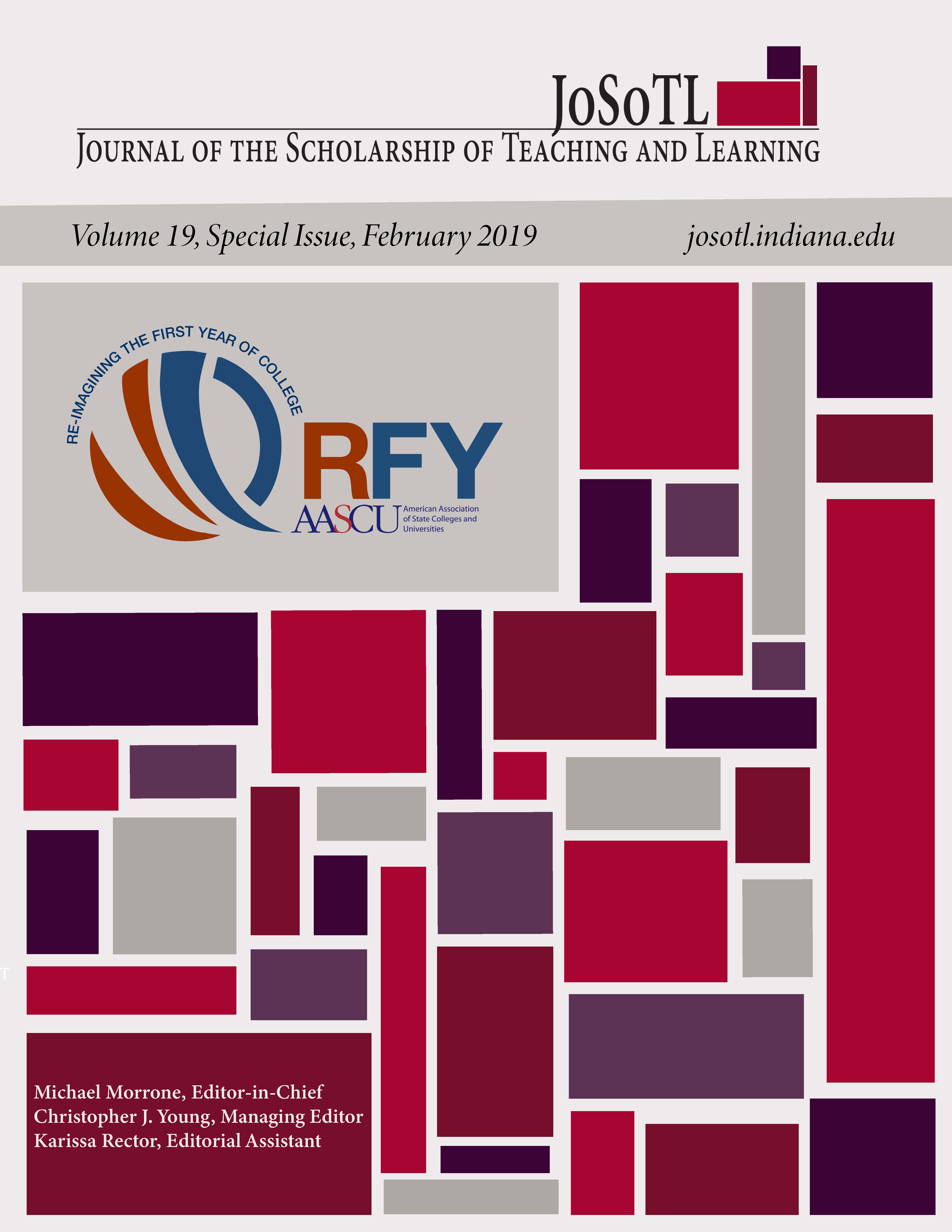Developing Faculty Communities of Practice to Expand the Use of Effective Pedagogical Techniques
Main Article Content
Abstract
The scholarship of teaching and learning literature is replete with examples of pedagogical techniques that have been demonstrated to be effective in improving learning, motivation, and student success. The extension of these techniques beyond the original context has tended to be slow, difficult, and incomplete. The following paper examines an intervention designed to encourage the exploration and use of a variety of pedagogical techniques by faculty in a traditional, four-year college faculty within the context of the AASCU Re-imagining the First Year Initiative. Small groups of six to eight faculty, joined and created communities of practice. The groups were known as Pedagogical Interest Groups, or PIGs for short. The faculty read about and analyzed a series of pedagogical techniques and committed to introducing at least one technique into their courses to further explore the techniques. When the techniques were successful, the faculty members redesigned entire classes to expand the impact. The communities of practice were successful in encouraging faculty to explore a wide variety of techniques. The average faculty group explored eight different pedagogical techniques. Faculty were able to use the opportunity to experiment with techniques with the support from their colleagues in their PIG. A dozen techniques were explored across the PIGs and dozens of class sections have been completely redesigned. To date, over 2000 students have experienced redesigned courses. Measures of student success, satisfaction, and interest in those sections have increased. The effort has been accompanied by a robust increase in the campus-wide retention rates.
Downloads
Article Details
- Authors retain copyright and grant the Journal of the Scholarship of Teaching and Learning (JoSoTL) right of first publication with the work simultaneously licensed under a Creative Commons Attribution License, (CC-BY) 4.0 International, allowing others to share the work with proper acknowledgement and citation of the work's authorship and initial publication in the Journal of the Scholarship of Teaching and Learning.
- Authors are able to enter separate, additional contractual agreements for the non-exclusive distribution of the journal's published version of the work (e.g., post it to an institutional repository or publish it in a book), with an acknowledgement of its initial publication in the Journal of the Scholarship of Teaching and Learning.
- In pursuit of manuscripts of the highest quality, multiple opportunities for mentoring, and greater reach and citation of JoSoTL publications, JoSoTL encourages authors to share their drafts to seek feedback from relevant communities unless the manuscript is already under review or in the publication queue after being accepted. In other words, to be eligible for publication in JoSoTL, manuscripts should not be shared publicly (e.g., online), while under review (after being initially submitted, or after being revised and resubmitted for reconsideration), or upon notice of acceptance and before publication. Once published, authors are strongly encouraged to share the published version widely, with an acknowledgement of its initial publication in the Journal of the Scholarship of Teaching and Learning.
References
Abigail, L.K.M. (2016). Do communities of practice enhance faculty development? Health Professions Education, 2(2), 61-74.
Clarke, J., & Dede, C. (2009). Design for scalability: A case study of the River City curriculum. Journal of Science Education and Technology 18(4), 353-365.
DeDe, C. (2016). Designing an educational innovation to achieve scale: five critical concepts. The EvoLLLution. Retrieved June 13, 2018 from https://evolllution.com/managinginstitution/operations_efficiency/designing-an-educational-innovation-to-achieve-scale-fivecritical-concepts/ .
Elmore, R. F. (1996). Getting to scale with good educational practice. Harvard Educational Review, 66 (1), 1-26.
Dillenbourg, Pierre (2017). The challenges of scaling-up findings from education research in Meaningful education in times of uncertainty: A collection of essays from the Center for Universal Education. Retrieved June 13, 2018 from https://www.brookings.edu/opinions/the-challenges-ofscaling-up-findings-from-education-research/.
Flanders, G. (2017). The effect of gateway course completion on freshman college student retention. Journal of College Student Retention: Research, Theory & Practice, 19(1), 2-24.
Hainline, L., Gaines, M., Long Feather, C., Padilla, E., & Terry, E. (2010). Changing students, faculty, and institutions in the twenty-first century. Peer Review, 12(3), 7-11.
McBride, L. & Kanekar, A. (2015). The scholarship of teaching and learning: Origin, development, and implications for pedagogy in health promotion. The Scholarship of Teaching and Learning, 1(1) 8–14.
Teeter, C., Fenton, N., Nicholson, K., Flynn, T., Kim, J., McKay, M., O’Shaughnessy, B. & Vajoczki, S. (2011). Using communities of practice to foster faculty development in higher education. Collected Essays on Learning and Teaching, 4, 52-57.
Wenger-Traynor, E. & B. (2015). Communities of practice: A brief introduction. Retrieved June 13, 2018 from http://wenger-trayner.com/wp-content/uploads/2015/04/07-Briefintroduction-to-communities-of-practice.pdf.
Wenger-Trayner E & B. (2011). What are three key success factors for communities of practice? Retrieved June 13, 2018 from http://wenger-trayner.com/resources/key-success-factors/.
Wenger, E., McDermott, R., & Snyder, W.M. (2002). Cultivating communities of practice: A guide to managing knowledge. Boston: Harvard Business School Press.
